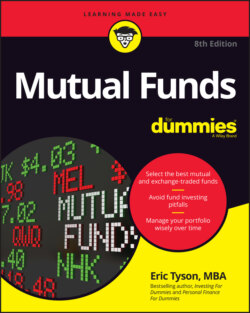Читать книгу Mutual Funds For Dummies - Eric Tyson - Страница 37
Fund managers’ expertise
ОглавлениеMutual funds are investment companies that pool your money with the money of hundreds, thousands, or even millions of other investors. The company hires a portfolio manager and a team of researchers whose full-time job is to analyze and purchase investments that best meet the fund’s stated objectives.
Typically, fund managers are Chartered Financial Analysts (CFAs) and/or graduates of the top business and finance schools in the country, where they study the principles of portfolio management and securities valuation and selection. In addition to their necessary educational training, the best fund managers typically have a decade or more of experience in analyzing and selecting investments.
A fund management team does more research and due diligence than you could ever have the energy or expertise to do in what little free time you have. Investing through funds can help your friendships, and maybe even your love life, because you’ll have more free time and energy!
Consider the following activities that an investor should do before investing in stocks and bonds of their own choosing:
Analyze company financial statements: Companies whose securities trade in the financial markets are required to issue financial reports every three months detailing their revenue, expenses, profits and losses, and assets and liabilities. Unless you’re a numbers geek, own a financial calculator, and enjoy dissecting tedious corporate financial statements, this first task alone is reason enough to invest through a fund and leave the driving to the fund management team.
Talk with the muckety-mucks: Most fund managers log thousands of frequent-flier miles and hundreds of hours talking to the folks running the companies they’re invested in or are thinking about investing in. Because of the huge amounts of money they manage, large fund companies even get visits from company executives, who fly in to grovel at the fund managers’ feet.
Analyze company and competitor strategies: Corporate managers have an irritating tendency to talk up what a great job they’re doing. Some companies may look as if they’re making the right moves, but what if their products are soon to lag behind the competition’s? The best fund managers and their researchers take a skeptical view of what a company’s execs say — they read the fine print and conduct other investigative work. They also keep on top of what competitors are doing. Sometimes they discover investment ideas better than their original ones this way.
Talk with company customers, suppliers, competitors, and industry consultants: Another way fund managers find out whether a company’s public relations story is full of holes instead of reality is by speaking with the company’s customers, suppliers, competitors, and other industry experts. These people often have more balanced viewpoints and can be a great deal more open about the negatives. These folks are harder to find but can provide valuable information.
Attend trade shows and review industry literature: It’s truly amazing how specialized the world’s becoming. Do you really want to subscribe to business newsletters that track the latest happenings with ball bearing or catalytic converter technology? They’ll put you to sleep in a couple of pages. Unlike popular mass-market publications, they’ll also charge you an arm and a leg to subscribe.
Take a disciplined approach: Another thing great managers do is bring a strict discipline that clarifies what makes a stock attractive and when it no longer is and should be sold. Lack of discipline is shown by countless studies to be highly associated with poor results, because without a clear process, the tendency is for inexperienced investors to buy high when everything feels good and sell low when everyone is fearful. Discipline and process provides skilled managers with a clear framework to take advantage of good opportunities that others miss, such as during the inevitable swings between fear and greed.
